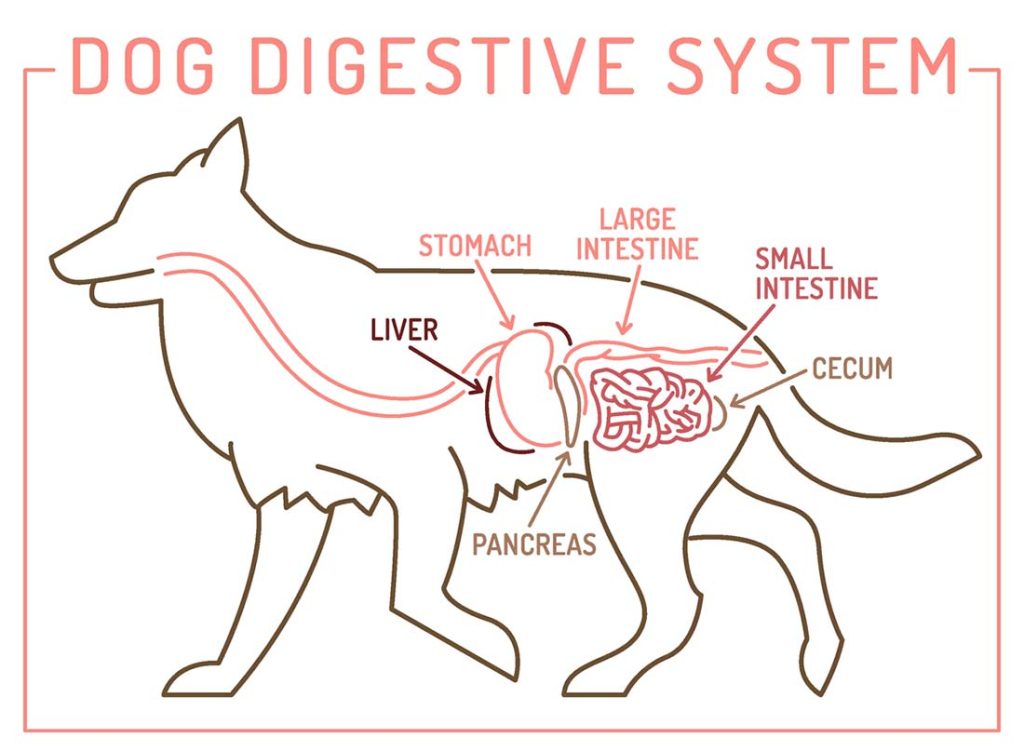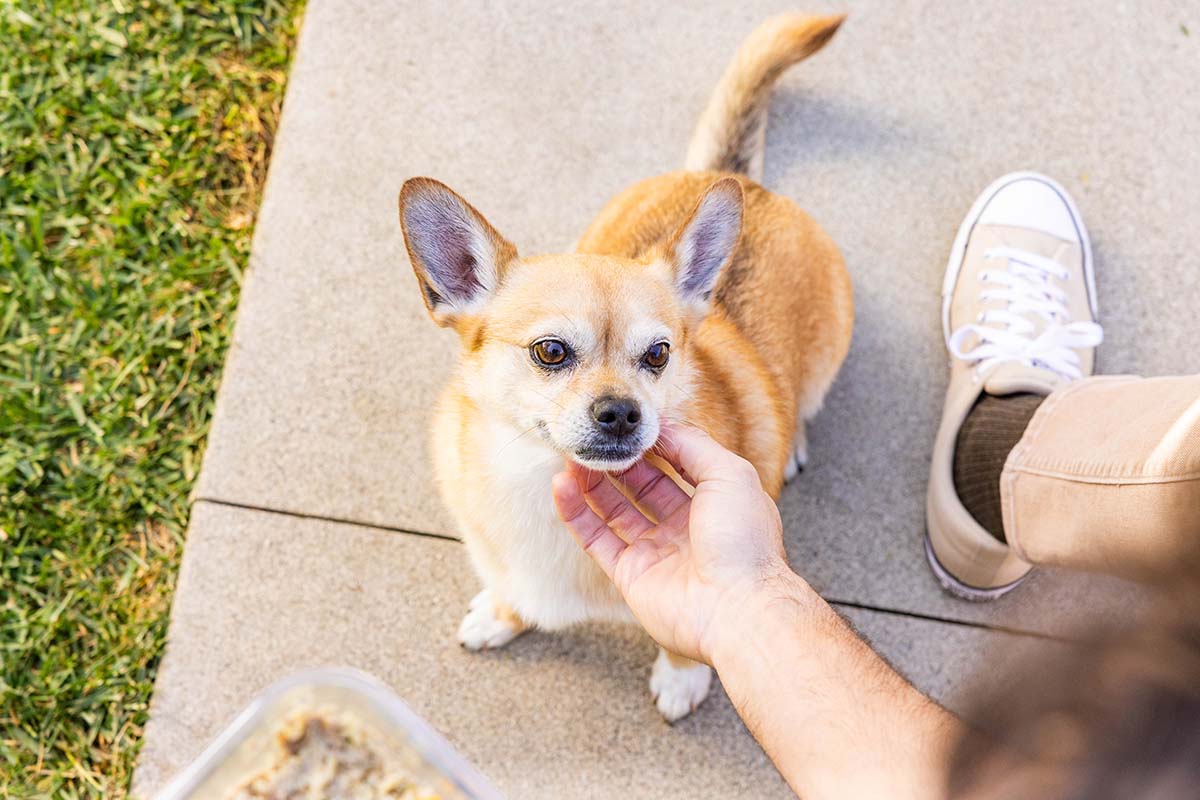What Toxins Cause Pancreatitis in Dogs?
Excess fat is a common cause of pancreatitis issues, but these toxins can also trigger pancreatitis in dogs.
A diagnosis of pancreatitis can be a serious indicator of your dog’s health, and no one wants to see their furry friend suffer. Here’s how to help prevent and recognize symptoms of pancreatitis in dogs.
What Is Pancreatitis?

Pancreatitis in dogs is the swelling or inflammation of the pancreas. The pancreas’ job is to create digestive enzymes that help break down food in the small intestine and to produce hormones like insulin that help regulate glucose (blood sugar). When the pancreas becomes inflamed it can’t produce pancreatic enzymes or hormones. This results in symptoms like abdominal pain, nausea, vomiting, and diarrhea.
Types of Pancreatitis
There are two ways pancreatitis is classified: acute pancreatitis and chronic pancreatitis.
Acute pancreatitis can come on suddenly, usually takes place over a short period, and doesn’t typically have long-term effects on your dog’s liver.
Chronic pancreatitis is a more severe pancreatitis. It’s progressive and persistent over some time and can cause long-term damage to the liver or kidneys.
What Causes Pancreatitis in Dogs?
The cause of pancreatitis in dogs isn’t always 100% clear. It can be caused by high-fat diets and consuming food or medications that are toxic to dogs.
Dogs and cats can both develop either acute or chronic pancreatitis, and severe cases of pancreatitis can be life-threatening to pets.
Risk Factors and Top Causes of Pancreatitis in Dogs:
- Poisoning or toxicity — ingesting toxins from food, medication, or household products
- Hypothyroidism — a hormone imbalance that impacts thyroid function
- Obesity — high body weight and high body fat content
- Diabetes mellitus — hyperglycemia and insulin deficiency
- Dietary indiscretion — eating fatty foods or table scraps that aren’t good for dogs
Toxins That Cause Pancreatitis in Dogs

Organophosphates — Found in certain pesticides, insecticides, and herbicides, organophosphates are toxic to both humans and pets. Dogs who ingest or inhale too much of these toxins may show symptoms like becoming agitated, loss of muscle control, and even seizures.
Chocolate — A sweet treat for humans, most pet owners know that chocolate is a big no-no for dogs. While some dogs are more sensitive to chocolate than others, it contains an alkaloid called theobromine which dogs can’t metabolize. If ingested, the theobromine in chocolate can cause severe panting, vomiting, diarrhea, extreme thirst, or increased heart rate in dogs.
Zinc — While some zinc is necessary for dogs and cats along with other minerals in their diet, too much zinc can be very dangerous. Zinc toxicosis in pets is typically the result of ingesting an object that contains or is coated with too much zinc, like pennies or other metal objects. Signs of zinc poisoning in dogs can be lethargy, loss of appetite, diarrhea, or seizures.
Lilies — No matter how pretty the flowers may be, lots of pet owners know to be wary of lilies around furry friends. Part of what makes lilies toxic to dogs and cats are the crystals of calcium oxalates that can’t be dissolved. Lilies can cause a number of serious health problems for pets if ingested, including kidney failure, irregular heartbeat, and gastrointestinal issues.
Types of Lilies That Are Toxic to Dogs:
- Easter lilies
- Tiger lilies
- Daylilies
- Japanese lilies
- Stargazer lilies
- Oriental lily hybrids
- Casa Blanca lilies
Toxicity in Dogs
You can’t possibly watch your pup every second of the day, and you may not see them ingest something they shouldn’t. Knowing the signs of poisoning and toxicity in dogs and taking action when you recognize them is the best way to prevent and treat issues like pancreatitis.
Signs of Toxicity in Dogs
- Decreased activity
- Excess drooling
- Loss of appetite
- Nausea
- Vomiting
- High body temperature
- Dehydration
- Lack of urination
If you suspect your dog or cat has been poisoned or ingested a toxic substance, call emergency pet services right away.
Pet Poison Helpline: (800) 213-6680
ASPCA Animal Poison Control Center: (888) 426-4435
What the Vet Will Do

Some toxic substances have a specific antidote used to treat symptoms caused by ingestion, while ingestion of other substances may be treated with supportive care. This usually includes:
- IV fluid therapy (intravenous fluids) to replenish electrolytes
- Charcoal therapy to neutralize toxic substances
- Medications and supplements to support the liver
- Induced vomiting may also be used to rid your dog’s body of the toxic substance.
Symptoms of Pancreatitis in Dogs
Concerned your dog might be experiencing a bout of pancreatitis? Knowing the signs and symptoms of pancreatitis in dogs will allow you to help your pup rest and recover sooner should they get it.
Clinical signs of pancreatitis in dogs include:
- nausea
- vomiting
- fever
- lethargy
- abdominal pain
- diarrhea
- decreased appetite
During a bout of pancreatitis, some dogs may take a ‘praying position.’ This is when a dog puts their bottom in the air and stretches their front legs out in front of them with their head down low. It’s thought that this position can provide dogs with some relief from abdominal pain caused by pancreatitis.
How Is Pancreatitis Diagnosed in Dogs?
To diagnose pancreatitis in dogs, your vet will likely perform a blood test to measure the amount of pancreatic enzymes present in your dog’s blood cells. A test for pancreatic lipase immunoreactivity (PLI test) with a positive result means your dog does have pancreatitis. Your veterinarian may also use X-rays or ultrasounds to rule out other causes of pancreatitis symptoms.
Which Dog Breeds Have More Cases of Pancreatitis?

There are no known genetic predispositions known to cause pancreatitis in dogs. Pancreatitis can affect any size, age, or breed of dog, though it is more common in certain breeds. This is due to risk factors like high levels of fatty acids in the blood called triglycerides, and overproduction in the adrenal glands known as hyperadrenocorticism or Cushing’s Disease.
Breeds that tend to have more bouts of pancreatitis include:
- Miniature schnauzers
- Cocker Spaniels
- Poodles
- Yorkshire Terriers
- Dachshunds
How To Help Prevent Pancreatitis in Dogs
- Avoid sharing table scraps — this is one of the easiest ways for dogs to ingest something they shouldn’t.
- Don’t let your dog eat trash
- Secure all household items like cleaning products, pesticides, and medications
- Keep your dog on a balanced, low-fat diet made from whole ingredients
- Stick with dog food made with whole ingredients
Citations
“Pancreatitis in Dogs.” n.d. Vca_corporate. https://vcahospitals.com/know-your-pet/pancreatitis-in-dogs.
Adeyinka, Adebayo, and Louisdon Pierre. 2019. “Organophosphates.” Nih.gov. StatPearls Publishing. May 14, 2019. https://www.ncbi.nlm.nih.gov/books/NBK499860/.
IARC Working Group on the Evaluation of Carcinogenic Risk to Humans. 2011. “Theobromine.” Nih.gov. International Agency for Research on Cancer. 2011. https://www.ncbi.nlm.nih.gov/books/NBK507032/.
“Which Lilies Are Toxic to Pets? | ASPCA.” n.d. Www.aspca.org. https://www.aspca.org/news/which-lilies-are-toxic-pets.
Weir, Malcolm, and Ernest Ward. 2009. “Cushing’s Disease in Dogs.” Vca_corporate. 2009. https://vcahospitals.com/know-your-pet/cushings-disease-in-dogs.
This content is for informational use only and does not replace professional nutrition and/or medical advice, diagnosis, or treatment. Do not rely on or use as a substitute for specific nutrition and/or medical recommendations. Please talk with your veterinarian about any questions or concerns.








